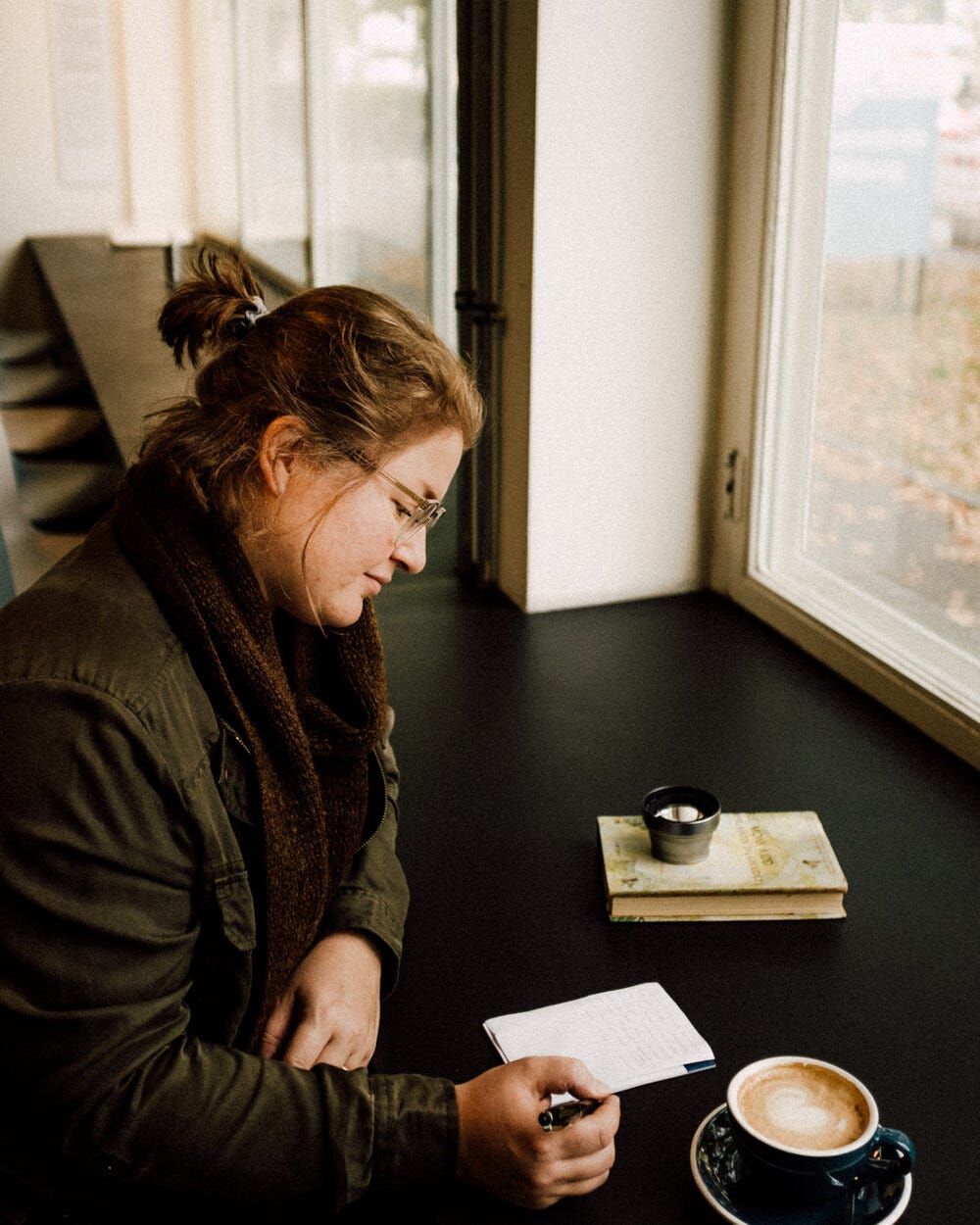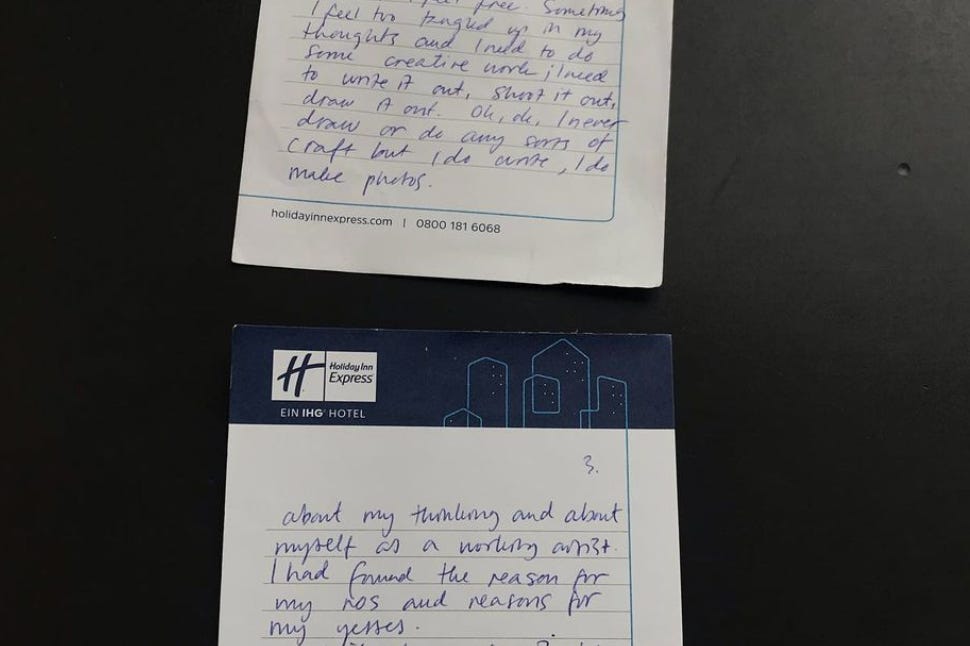Writing feels slow, and I’m fast. It takes up so much time, and I never seem to have enough. Yet, I keep doing it—because I have to. I’ve always written. Some might call it my "calling," but I don’t like that word. I just think writing makes me a better person.
Juha and Merete
I'm forever grateful to my high school Finnish (mother tongue) and literature teacher, Juha. He didn’t just teach grammar and punctuation; he taught us how to think through writing. Finnish classes were about finding and developing our voices.
Thanks to Juha, I learned to appreciate the writing process and how it clarifies and sharpens thinking. Even now, as a 40-year-old writer, I still love the process—though I’ve come to love many things more. Writing for businesses and others has taught me the well-worn truth: writing really is thinking. Finnish author Merete Mazzarella said it best:
Writing isn’t just recording what you already know; it’s thinking about new thoughts.
And who wouldn’t want new thoughts?
Write Plenty, Write Garbage
So, how do you write something good? By writing something bad—lots of it.
In her cult classic Writing Down the Bones, Natalie Goldberg shares that she aims to fill a notebook every month, alongside the pieces that pay her bills.
Sure, it would be nice to only write “real” texts, but the rhythm and routine come from making writing a habit. Morning Pages, keeping a diary, or writing for Substack Notes—all of it matters. Writer’s block? It happens when you don’t sit at the keyboard often enough.
As Anne Lamott famously said in Bird by bird:
Get it all down. Let it pour out of you and onto the page. Write an incredibly shitty, self-indulgent, whiny, mewling first draft. Then take out as many of the excesses as you can.
You have to embrace those terrible first drafts.
Many of us wants to write more, but the threshold for actually doing it is too high. Writing doesn’t have to be a big deal. You don’t have to aspire to be an author or dream of a writer’s life. Don’t even worry about whether you're doing it “right,” because you are.
There’s no wrong way to write.
The Feeling of Insight
Couple of months ago In March (oh, how time flies) I found a kindred spirit—someone else who had never dreamed of writing a book. For the first time, I wasn’t alone in this thought. I was with Charlotte, who writes .
I, too, prefer writing other things. Today, I mainly write to gain insight.
There are two kinds of insight: the first is meta-level, the magical feeling that happens when words fall into place. The cursor blinks faster, the page seems to warm up. It’s as if the act of writing itself reveals something deeper.
The second kind is intellectual insight—the kind that sharpens your thinking. We’ve all felt this when learning something new. For me, reading and writing go hand in hand. You must read in order to write.
When I’m writing on a completely unfamiliar topic—like a client article—I think of professor Jaana Hallamaa:
Everything becomes interesting once you dive deeper.
Of course, this doesn’t require writing—reading can also unlock new insights. But for those of us who are compelled to write, gaining that deeper understanding becomes the reward.
I chose to write my Master’s thesis on James Lovelock’s Gaia hypothesis. While the result wasn’t groundbreaking, I’ll always be grateful to professor Hallamaa for pushing me to dive deeper.
Writing Towards Something
Or maybe she was pushing me towards something…? It’s so easy to dance around a topic and never reach its core. Just planning to go for a run doesn’t move your feet.
Anything worthwhile is hard at first. So hard, in fact, that you may want to quit. It’s hard because we can’t always grasp our thoughts—they can be dark and fuzzy.
But when that happens, it’s important not to drown ourselves in another round of research or write endless introductions to every paragraph. When our thinking is still forming, it’s essential to go deeper, not wider.
I get it. You might be afraid. That’s ok. We’re in this together.
Sometimes, I’m afraid of what I might uncover if I truly dive in. I feel vulnerable, even though I know this is exactly what I should be writing about. But it would be so much easier to just carry on with the day like always.
Approaching a topic through writing is also approaching yourself. When you peel back the layers, you stay with it, examine it, and take another look. Your thinking becomes clearer, and your mind makes room for new ideas.

Save Me From Slow and Boring
In our fast-paced world, our brains crave quality time with us. Reading and writing provide exactly that—they’re slow, deliberate activities, ones that you can only push so far before they push back.
But oh, how I wish I could rush them! I’d love to read faster and write faster, but I’m so slow. I eat fast, talk fast, and sometimes even think fast—but when it comes to reading and writing, I’m slower than my three-year-old perfecting the art of procrastination.
For me, writing isn’t just slow—it’s often downright boring. Even my late-night bursts of inspiration (“This will make an amazing Substack post!”) lose their sparkle as soon as they hit the page. That initial excitement fades quickly, and the grind of turning a thought into words takes over.
So, why do I keep writing? If it’s so slow and tedious, why do I bother?
There’s no simple answer, but I believe writing makes me a better person. It feels worth it. In fact, I feel worth it.
Once I finally sit down and push through the resistance, I find my rhythm. The routine becomes a buffer against boredom, and in those slow, quiet moments, I get to spend time with my own thoughts. In a world that never seems to slow down, that feels like a gift.
A Simple Exercise to Jumpstart Your Writing
My complicated relationship with writing means I sometimes have to remind myself how valuable the process is. It really does make you a better person afterward—just do it.
Sometimes, when writing feels tough, all I need is a little nudge to get my thoughts flowing. Here’s a quick exercise that helps spark new ideas by engaging both your reading and writing brain:
Pick a piece to read: Grab a book, magazine, article, or a Substack post.
Take out some note-taking tools: You can use a notebook, your phone, or a computer—whatever feels comfortable.
Get in the zone: Put your phone away (unless you're taking notes on it!), relax your shoulders, and take a deep breath.
Start reading: Choose a short passage or set a timer for 5 minutes.
Jot down your thoughts: As you read, write down every thought that comes to mind—big or small, related or unrelated.
Reflect: When you're done, look over your notes. Do you notice any patterns? Are certain ideas standing out?
Write something based on your notes: It could be an essay, poem, opinion piece—whatever feels natural.
I chose to read an essay by Suvi Ahola (paywall) from Helsingin Sanomat, Finland’s largest newspaper. It addresses the climate crisis and suggests that literature can help shift our perspectives. Here are some thoughts that surfaced while reading:
I should take an essay writing course.
When will I pick up the next book by Juha Itkonen?
Pirkko Saisio is a friend of my mother-in-law.
I probably first heard the word “pollution” in the 90s.
Ozone depletion and the greenhouse effect.
Look up Koskisota.
It's easier for people to protect their own than to think about steering the future > Abstraction is hard for us.
Prose can also change the world > Writers offer fresh perspectives.
Changing minds through stories.
How can we make the survival struggle about future generations?
What role could art play?
These are just snippets, but they show how much is brewing beneath the surface while we read and write.
Cherish Your Writing Space
I believe writing can change both myself and the world—and that’s the kind of writing I can’t live without. It doesn’t have to be grand or pompous, as long as it’s true.
To write more, though, you have to make space for it. I escaped social media and established my writing practice here in Substack. I gave up my photography clients for personal projects that inspire writing. I even gave up my podcast because I felt talking took up space meant for writing.
So, take time for writing, and make it as enjoyable as possible. But stop overthinking it. Focus on what you want to say, not on the process itself. Routine and love will help the words fall into place, and rewriting will reveal their true shape.
When we write, we think. And when we think, we change.
Writing gathers our scattered thoughts. In the end, we become wiser, seeing more shades in what once seemed black and white. But only if we believe it’s worth it—because it’s not always easy.






Oh, I totally agree, and I think it's so very important to accept that writing can also be - at least sometimes - slow, boring, tedious. And that's ok. This is one of the ways I see it: the moment we get that late-night burst of inspiration you wrote about is actually the moment we say hello to that creation. It's already there. Existing in a kind of pure essence (however modest). Giving it flesh and bones - form, structure, purpose, words - is slow and it's possible (likely even?) that we aren't able to transform that essence/feeling into words. No wonder writing can sometimes feel uncomfortable. But what would there be if we didn't sit down and just do it, despite everything? A cloud of unrealised ideas? Only AI writing - sorry repeating - monotonous shit?
(And what if the inspiration is about building a house - how slow would that be😅)
Lucky you to have a teacher who taught to see writing as a vehicle for thinking. My lessons were mostly about grammar and structure. It was decades later when I discovered the power of writing. Writing is a privilege and choice. There are many options for size, shape, volume, purpose, speed and publication so that everyone can choose what works for them best.